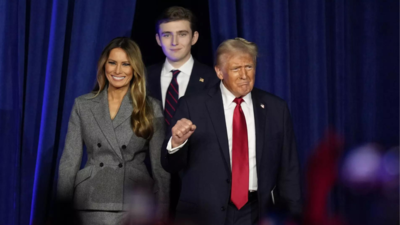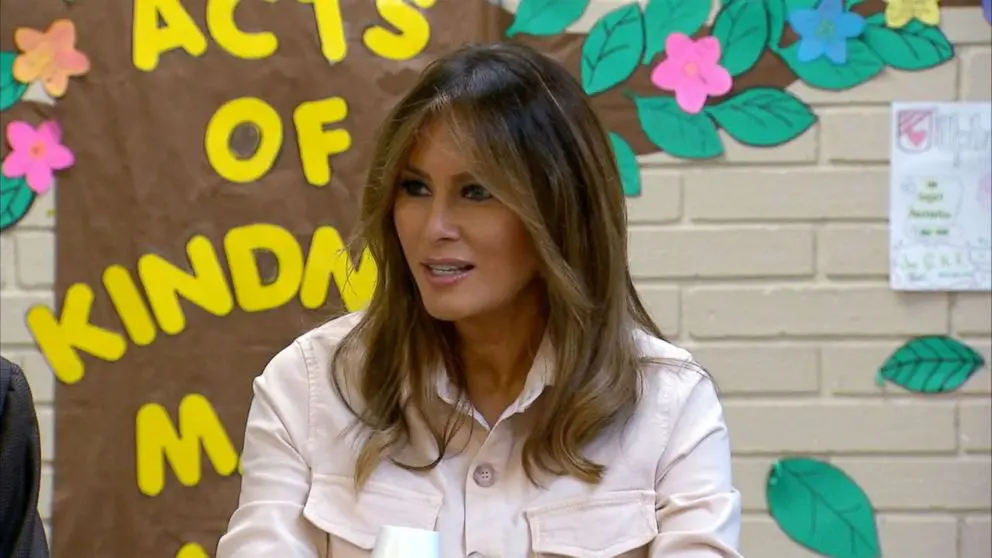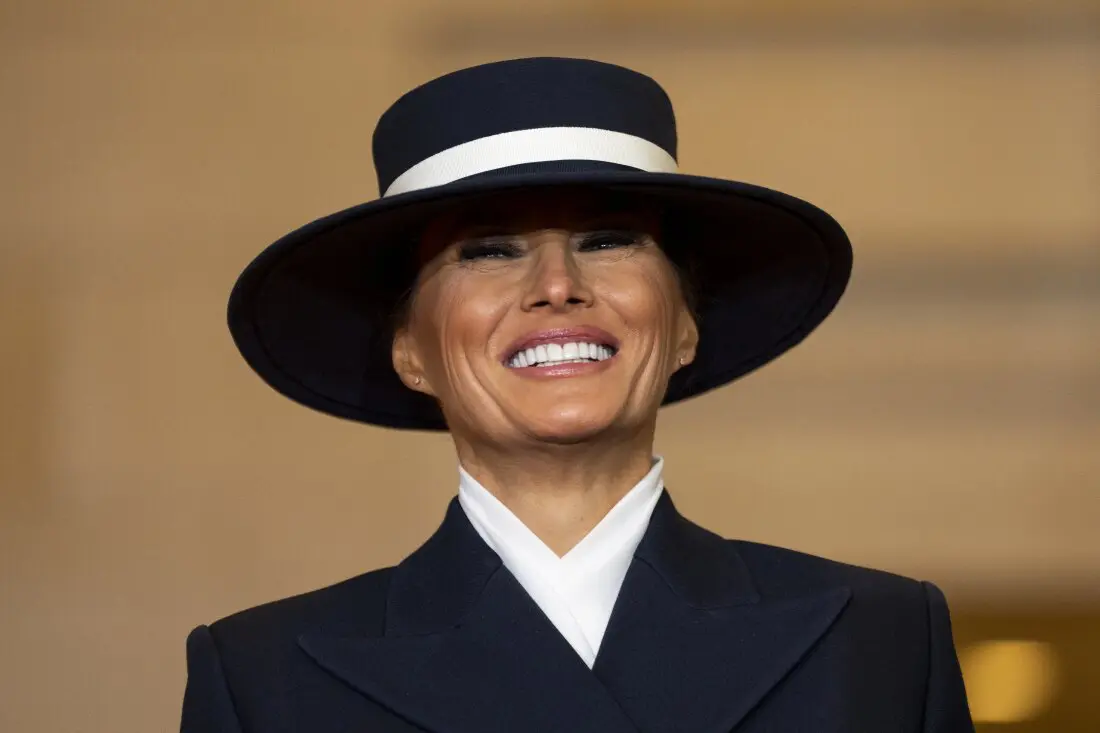Recently, Melania Trump has found herself in the eye of a media storm after Vogue, known for its influential advertising and fashion coverage, issued a controversial critique. The piece labeled her official White House portrait as reminiscent of a ‘freelance magician’ rather than the role expected of a First Lady. Friends and supporters of Trump, including Bill White, have passionately defended her, urging a boycotting of Vogue and dubbing it ‘Condé Nasty.’ This situation offers a glimpse into the often volatile intersection of fashion, politics, and public perception, where every image and critique matters.
The political dynamics surrounding Melania Trump are complex, not only due to her role as the spouse of former President Donald Trump but also as a high-profile figure in a global spotlight. Her supporters have taken it upon themselves to ardently express their dissatisfaction with how she has been portrayed in major publications. This article delves into the implications of Vogue’s comments, the response from Melania’s allies, and the broader narrative of style and identity in modern politics.
Vogue’s Controversial Commentary
The critique from Vogue’s op-ed was not just another run-of-the-mill fashion review; it had underlying tones that stirred outrage among Trump’s friends and supporters. Within its article, Vogue claimed, ‘Trump looked more like she was guest starring on an episode of ‘The Apprentice’ than assuming the role of First Lady of the United States,’ framing her as out of touch with the traditional image expected of someone in her position.
The harsh language used left many questioning the motivations behind such a description. Vogue suggested that her previous official portrait from 2017 appeared excessively airbrushed, invoking a sense of disapproval not only of the image but also of the woman it depicted. White, a longtime supporter, highlighted how Melania possesses qualities that should be celebrated; he described her as ‘truly elegant and eloquent,’ emphasizing her prowess beyond superficial appearances.
Fashion, Politics, and Public Perception
At the intersection of fashion and politics, the portrayal of Melania Trump becomes a profound case study about identity and perception. The media often wields its power to shape narratives, and in this instance, Vogue’s commentary on her image amplified discussions about professionalism, style, and the judgment faced by public figures—especially women. Melania’s critics often liken her depiction to a necessary reflection of her husband’s presidency, suggesting that her image and public presence are inexorably linked with broader political context.
During her time as First Lady, Melania faced constant scrutiny that often transcended her work and aesthetic choices. From fashion decisions to humanitarian efforts, the media’s portrayal of Melania has consistently been doubled-edged. Instances such as the one with Vogue highlight the larger struggle of women in the political arena, where they are often judged for their choices in appearance and fashion, overshadowing their accomplishments and intentions.
The Defense: Friends Rally Around Melania
In light of Vogue’s less-than-flattering portrayal, Melania Trump’s friends have leaped to her defense, emphasizing her admirable qualities. Members of her inner circle argue that Vogue’s critique is a reflection of bias rather than an objective assessment. Bill White, well-connected in political circles and rumored to be a future ambassador, voiced a call to action: ‘We have cancelled all our subscriptions to Condé Nasty. I encourage everyone who loves America to do the same.’ This rallying cry reflects a broader sentiment among her supporters who feel that the media’s attack on Melania is an attack on American values.
Supporters paint her as an intelligent and strategic individual, fluent in multiple languages and a successful businesswoman. White noted her elegance, which stands in stark contrast to the portrayal offered in the Vogue commentary. This highlights an interesting aspect of public personas, where a substantial gap often exists between personal relationships and media representations.
The Impact of Public Opinion
Melania Trump’s circumstances offer a lens through which to view the impact of public opinion on personal identity. Observers and critics regularly wrestle with the dual facets of her character; is she merely a reflection of her husband’s legacy, or does she stand as an independent figure in her right? The question becomes particularly salient when discussing her need for representation in mainstream fashion. Her comments about not wishing for Vogue cover stardom reinforce a sense of autonomy; ‘We have so many other important things to do than to be on the cover of any magazine.’
This sentiment echoing through her allies demonstrates her detachment from traditional validation often sought by public figures. Melania’s focus on her role as a mother and wife stands out as an alternative narrative to the glamorous expectations that typically accompany First Ladies. Supporters argue that her decision to put family first, rather than seeking relentlessly to be perceived favorably in fashion circles, solidifies her strength of character.

The Fashion World’s Response
The response from the fashion community regarding Melania Trump’s portrayal has been varied. While many support Vogue and share similar sentiments in regards to her image, others have taken a more measured approach, recognizing the complexity surrounding her public persona. Critics argue that dissing someone based on their appearance is counterproductive and does not elevate the conversation around fashion and politics.
The Role of Designers and Branding
Fashion designers play a crucial role in how public figures are perceived. During her husband’s presidency, several designers openly refused to dress Melania, publicly boycotting her in what they termed a political statement. This further complicated the narrative about her style and success as a First Lady. Such actions reflect a broader trend within the industry where fashion is emblematic of political identity—a reflection of the political climate of the time.
Designers and influencers often wield their power from behind the curtain, choosing when and how to engage with political figures based on their public acceptance. This has led to a discourse surrounding who gets to participate in the fashion narrative and what criteria dictate their inclusion. Melania’s sidelining by some designers highlights how actors within the fashion world curate their identities using public opinion as leverage.
Social Media’s Role in Shaping Opinions
Social media has become an indispensable tool for both public figures and their critics. In recent years, platforms like Twitter and Instagram have reshaped how individuals engage with politics and fashion. The immediate nature of these platforms allows supporters and detractors alike to share their opinions swiftly, often leading to intense discourse surrounding public figures like Melania Trump.
As her portrait became a topic of discussion, the dialogues sparked on social media showcased a range of opinions. Some took to Twitter to express support for Melania, while others reinforced Vogue’s sentiments. This real-time engagement inadvertently becomes a reflection of broader societal attitudes toward the former First Lady, revealing how quickly public opinion can shift based on one event or image.
The ability for influential figures to go directly to their audience allows for authentic narratives to emerge, as Melania Trump herself seemingly opts out of traditional avenues like Vogue. This creates space for an alternative narrative—one that champions her strength beyond the realm of beauty and fashion norms dictated by major publications.

Revisiting the Perception of First Ladies
Melania Trump’s experience raises critical questions regarding the evolving perception of First Ladies in American society. Traditionally, First Ladies have occupied a dual role of public servant and symbolic representation of their families and husbands. However, with the rise of social media and shifting political landscapes, the scrutiny and expectations placed upon these women have evolved as well.
Historical Context of First Ladies
First Ladies, from Martha Washington to Jill Biden, have each faced scrutiny reflective of their respective times, though Melania’s experience is particularly unique due to her celebrity status and the hyper-political environment surrounding her. Historically, First Ladies have been able to shape their narratives through various means, including charity work, public appearances, and media relations. Melania’s background as a model adds significant layers to her public perception—one that Vogue’s recent commentary complicates further with stigmatizing language.
Exploring how previous First Ladies managed public opinion can offer insight into Melania’s relationship with the legacy of her predecessors. While some sought acceptance through fashion, Mellania Trump is portrayed as stepping outside those boundaries, yet often criticized for lacking conventional elegance deemed appropriate for First Ladies. Her notion of beauty, however, is consistently redefined through her support system and how she chooses to represent herself.
The Future of First Ladies in the Media
The discussions and critiques surrounding Melania Trump serve as a reflection of the future of First Ladies in the media landscape. Moving forward, the relationship between public figures, fashion, and media representation will continue to evolve. As society grapples with notions of respect and beauty, future First Ladies may find themselves navigating similarly hostile terrains that challenge their identities and roles.
For Melania, the criticism from Vogue has highlighted how far removed she is from traditional expectations of celebrity and aesthetic presentation. If anything, it underscores a shifting perception of what a First Lady should represent—an archetype that may yet be defined by resilience against media condemnation.
As new generations of First Ladies potentially emerge, grappling with the complexities arising from the intersection of fashion and politics will be paramount. Their ability to define their identities in spite of relentless media pressure represents a vital challenge to overcome while striving to fulfill the legacy of public service.

What Lies Ahead for Melania Trump?
As Melania Trump and her supporters continue to respond to the ongoing dialogue stemming from Vogue’s critique, the broader implications for her public identity and personal journey are profound. Emphasizing her virtues—education, resilience, and strategic mindset—her defenders strive to reshape the narrative into a more favorable portrayal, against an often hostile media landscape.
Redefining Beauty and Influence
How Melania Trump chooses to navigate her identity moving forward may well define how society perceives future First Ladies. With a complex relationship with the fashion world, her stance against traditional validation may inspire other women to carve their paths outside of defined and often rigid societal norms.
In recent discussions, Melania’s commentary about her priorities as a First Lady encapsulates a desire to transcend the superficial aspects often tied to the glamour associated with the role. Through various channels—social media, charitable inclinations, or personal endeavors—she may find ways to influence public perceptions that do not stick to the script laid out by the fashion narrative.
Conclusion: Legacy and Impact
The impact of Vogue’s remarks on Melania Trump’s image is multifaceted, instigating conversations about identity, feminism, and the influence of media on public perception. As she continues navigating her role amid a swirling storm of media narratives, the way forward may involve redefining what it means to be a First Lady in the modern age.
Melania’s story illustrates the trials faced by women in the public eye—showcasing the ongoing battle between personal identity and external expectations. How she chooses to embrace or resist these expectations will ultimately leave an indelible mark not only on her legacy but also on the future of women in political and public life.
I’m Mikael, a 35-year-old Gossip Gravity Creator. I’m passionate about curating captivating content that sparks conversations and ignites curiosity. Join me on this exciting journey as we explore the fascinating world of gossip and trends together!


